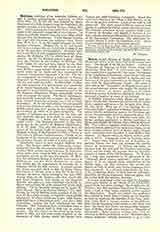

Melito, Saint, Bishop of Sardis, prominent ecclesiastical writer in the latter half of the second century. Few details of his life are known. A letter of Polycrates of Ephesus to Pope Victor about 194 (Eusebius, “Hist. Eccl.”, V, xxiv) states that “Melito the eunuch [this is interpreted “the virgin” by Rufinus in his translation of Eusebius], whose whole walk was in the Holy Spirit“, was interred at Sardis, and had been one of the great authorities in the Church of Asia who held the Quartodeciman theory. His name is cited also in the “Labyrinth” of Hippolytus as one of the second-century writers who taught the duality of natures in Jesus. St. Jerome, speaking of the canon of Melito, quotes Tertullian‘s statement that he was esteemed a prophet by many of the faithful.
Of Melito’s numerous works almost all have perished; fortunately, Eusebius has preserved the names of the majority and given a few extracts (Hist. Eccl., IV, xiii, xxvi). They are (I) “An Apology for the Christian Faith“, appealing to Marcus Aurelius to examine into the accusations against the Christians and to end the persecution (written apparently about 172, or before 177). This is a different work from the Syriac apology attributed to Melito, published in Syriac and English by Cureton from a British Museum MS. The latter, a vigorous confutation of idolatry and polytheism addressed to Antoninus Caesar, seems from internal evidence to be of Syrian origin, though some authorities have identified it with Melito’s Peri aletheias. (2) Peri tou pascha, on Easter, written probably in 167-8. A fragment cited by Eusebius refers to a dispute that had broken out in. Laodicea regarding Easter, but, does not mention the precise matter in controversy. (3) Eklogai, six books of extracts from the Law and the Prophets concerning Christ and the Faith, the passage cited by Eusebius contains a canon of the Old Testament. (4) E kleis, for a long time considered to be preserved in the “Melitonis clavis sanctae scripturm”, which is now known to be an original Latin compilation of the Middle Ages. (5) Peri ensomatou theou, on the corporeity of God, of which some Syriac fragments have been preserved. It is referred to by Origen (In Gen., i, 26), as showing Melito to have been an Anthropomorphite, the Syriac fragments, however, prove that the author held the opposite doctrine.
Fourteen additional works are cited by Eusebius. Anastasius Sinaita in his Odegos (P.G., LXXXIX) quotes from two other writings: Eis to pathos (on the Passion), and Peri sarkoseos Christou (on the Incarnation), a work in three books, probably written against the Marcionites. Routh (see below) has published four scholia in Greek from a Catena on the Sacrifice of Isaac as typifying the Sacrifice of the Cross, probably taken from a corrupt version of the Eklogai. Four Syriac fragments from works on the Body and Soul, the Cross, and Faith, are apparently compositions of Melito, though often referred to Alexander of Alexandria. Many spurious writings have been attributed to Melito in addition to the “Melitonis clavis sanctae scripturm” already mentioned—e.g., a “Letter to Eutrepius”, “Catena in Apocalypsin”, a manifest forgery compiled after A.D. 1200; “De passione S. Joannis Evangelistw” (probably not earlier than the seventh century), “De transitu Beatae Mariae Virginis” (see Apocrypha). Melito’s feast is observed on April 1.
A. A. MACERLEAN

